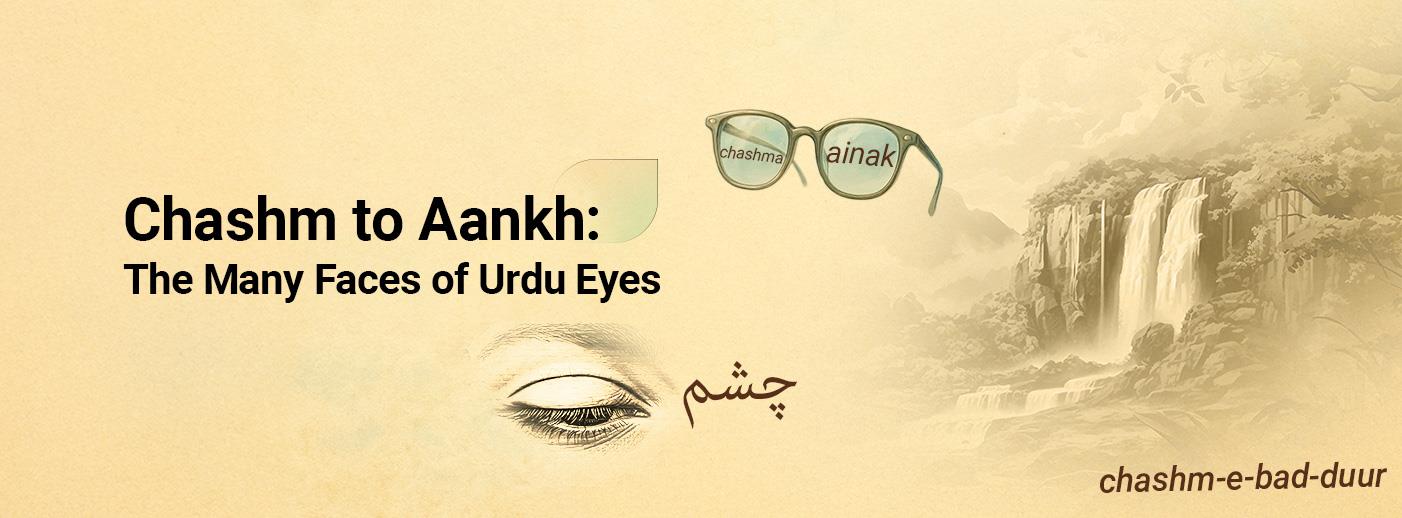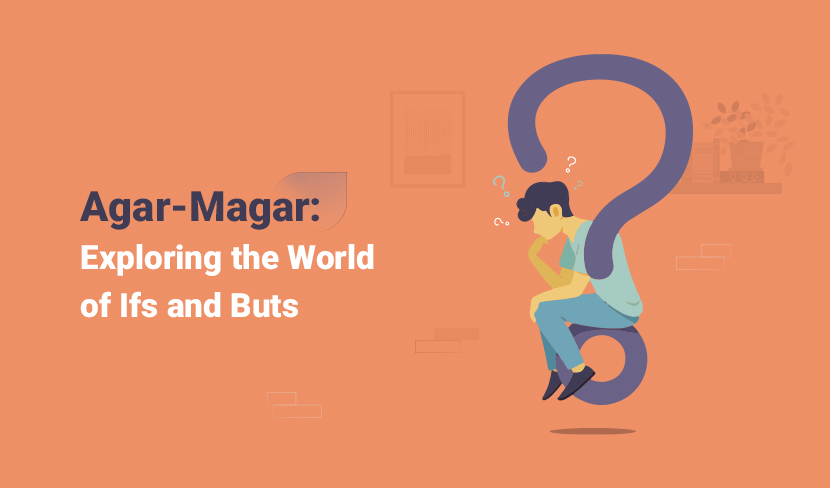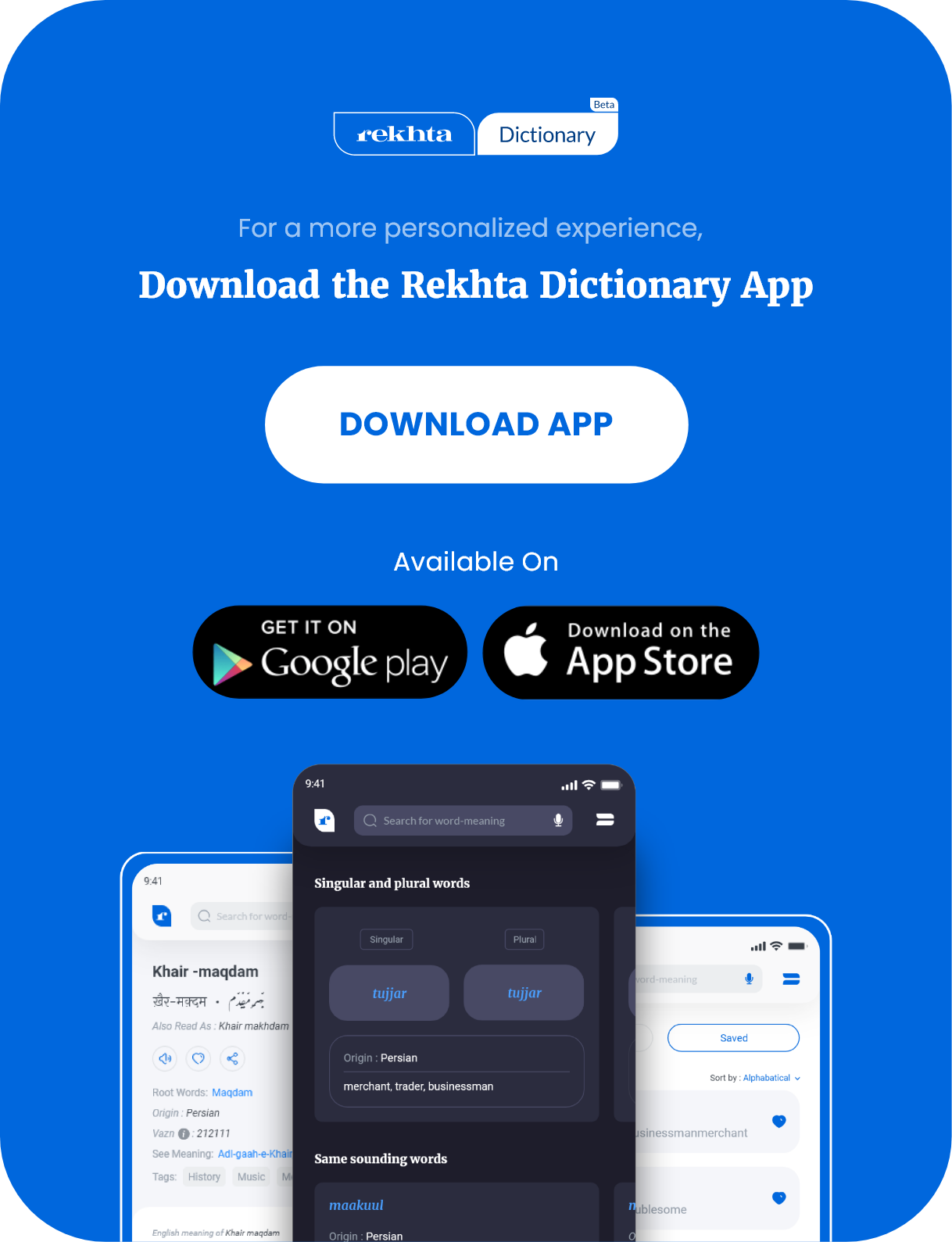زیادہ تلاش کیے گئے الفاظ
محفوظ شدہ الفاظ
کِھسیانی بِلّی کَھمبا نوچے
جسے غصہ آرہا ہو وہ دوسروں پر اپنی جھلاہٹ اتارتا ہے، بے بسی میں آدمی دوسروں پر غصہ اتارتا ہے، شرمندہ شخص دوسروں پر اپنی شرمندگی اتارتا ہے، کمزور کی جھنجھلاہٹ
چَمَنِسْتان
ایسا باغ جہاں پھول کثرت سے ہوں، ایسی جگہ جہاں دور تک پھول ہی پھول اور سبزہ سبزہ نظر آئے، گلزار، گلستان، باغ، پھولوں کا قطعہ، سبز کھیت
From Chashm to Aankh: The Many Faces of Urdu Eyes

You must have heard the two common Urdu words for eyeglasses — chashma (چشمہ) and ainak (عینک). And perhaps you also know that chashm (چشم) comes from Persian and means “eye,” while ain (عین) comes from Arabic and also means “eye.” Interestingly, ‘ain is also the name of a letter in the Urdu alphabet 'ع'
But here, we’re talking about chashm and ‘ain in their broader sense — and the fun part is, both these words also mean spring or fountain. Think of Kashmir’s famous Chashma Shahi (چشمہ شاہی), or the way people describe Urdu itself:
اردو جسے کہتے ہیں تہذیب کا چشمہ ہے
وہ شخص مہذب ہے جس کو یہ زباں آئی
“Urdu jise kehte hain tahzīb kā chashma hai,
Woh shakhs mohazzab hai jis ko yeh zabān āī.”
"Urdu is called the fountain of culture,
The one who knows this language is truly refined."
In Urdu poetry, the beloved’s eyes are often compared to those of a deer — Gazaal-chashm— what in Hindi we’d call mrignayani. And then there’s the lovely expression basar-o-chashm, which means: most willingly, gladly, by all means.
There’s also the expression chashm-e-bad-duur(چشم بَدْ دور)
“May God preserve you from the evil eye!”
Looking at ain we see that the word ainak is built from it. But ain has given us many other words too. For example:
qurrat-ul-ain (قرۃالعین) — literally, “the coolness of the eyes,” used for someone or something that brings comfort, joy, or love. Parents often use it for their children.:
nuur-ul-ain (نورالعین) — “the light of the eyes,” again, a term of endearment.
A famous writer of Urdu fiction was qurrat-ul-ain Hyder, often lovingly called Ainee Aapa. In legal language, you might have heard of an ainii-gavaah (عینی گواہ)— that’s an eye-witness.
And of course, when we say things like ain waqt or ain mauqa par the word ain means exact or real — as in “at the exact time” or “right on the spot.”
Parveen Shakir captures this beautifully in her romantic verse:
بات وہ آدھی رات کی رات وہ پورے چاند کی
چاند بھی عین چیت کا اس پہ ترا جمال بھی
“Baat woh ādhī raat kī, raat woh pūre chānd kī,
Chānd bhī ‘ain cheet kā, us pe tirā jamāl bhī.”
"It was that midnight hour, the night of a full moon,
The moon was at its brightest — and then, your beauty on top of it."
Another Persian-origin word for “eye” is diida (دیدہ) derived from diid meaning “to see.”:
You must have heard the word chashm-diid gavaah (چشم دید گواہ) — ‘eye-witness’.
Take a look at some interesting idioms and compound words with the word diida
• diide phaa.Dnaa— to stare or gaze intently.
• diida-var— one with vision, insight, perceptiveness.
• havaa.ii diida — someone restless, unable to settle, often used for playfully of careless boys and girls.
• diida-rezii — fine, painstaking work, requiring close inspection and attention.
And of course, the most common word is simply aankh (آنکھ) (aankh), from Sanskrit origin, which has given rise to hundreds of idioms in Urdu. In fact, in Farhang-e-Asafiya, one of the oldest dictionaries of Urdu, there are over three hundred forty idioms listed under aankh!
Here are a few still in use today:
• aa.nkh kaa taaraa — apple of the eye, someone very dear.
• aa.nkh dikhaanaa — to show anger or defiance.
• aa.nkh bhar aanaa — to come to tears
• aa.nkh lag jaanaa— to doze off
• aa.nkh milaanaa— to face someone boldly
• aa.nkh churaanaa — pretend not to see
• aa.nkh se girnaa— to fall from someone’s esteem
That’s the little journey of chashm, ain, diida, and aankh — four words, countless meanings, and a world of poetry, idioms, and cultural richness in Urdu.
Delete 44 saved words?
کیا آپ واقعی ان اندراجات کو حذف کر رہے ہیں؟ انہیں واپس لانا ناممکن ہوگا۔






